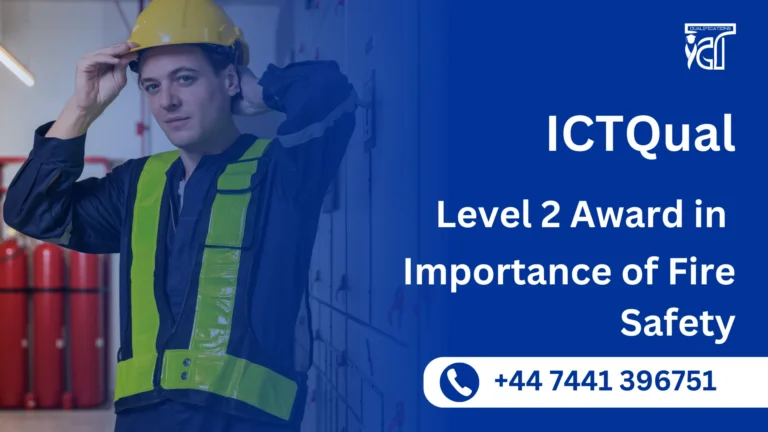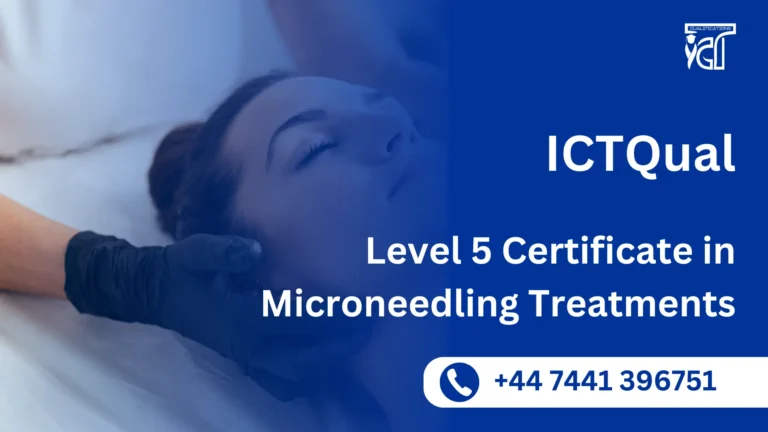The early years of a child’s life are crucial for cognitive, emotional, and social development. As the demand for qualified childcare professionals continues to rise globally, obtaining a formal, accredited qualification has become increasingly important. The ICTQual Level 3 Award in Early Learning and Childcare is designed to meet this need by equipping learners with the skills, knowledge, and understanding required to support children’s early development and care effectively.
The ICTQual Level 3 Award in Early Learning and Childcare is an internationally recognized qualification that provides learners with foundational knowledge and practical insights into early childhood education. Developed by ICTQual, a leading awarding organization specializing in competency-based training, this course is tailored for individuals who wish to work professionally in early years settings, nurseries, or as childminders.
The award is offered through ICTQual-approved training centers and institutions across various regions. Before enrolling, ensure that the provider is accredited and offers the support and resources you need for success, including access to tutors, placement opportunities, and ongoing guidance.
The ICTQual Level 3 Award in Early Learning and Childcare is more than just a qualification—it’s an investment in the future of both the learner and the children they will serve. With its comprehensive curriculum, international recognition, and focus on real-world application, this award is a smart choice for anyone passionate about early childhood education.
Whether you are aiming to enter the workforce, enhance your current role, or pursue further study, this course provides the professional foundation you need to thrive in the childcare and early learning sector.
ICTQual Level 3 Award in Early Learning and Childcare
Following are the study units of ICTQual Level 3 Award in Early Learning and Childcare:
- Child Development and Learning
- Curriculum Planning and Implementation
- Observation, Assessment, and Documentation
- Professional Development and Reflective Practice
- Partnership Working with Families and Communities
- Leadership and Management in Early Years Settings
- Supporting Children with Special Educational Needs and Disabilities (SEND)
GLH (Guided Learning Hours) and TQT (Total Qualification Time) are terms commonly used in vocational qualifications to help define the amount of time a learner is expected to spend on their studies.
1. GLH (Guided Learning Hours)
GLH refers to the number of hours a learner spends being directly taught, supervised, or supported during their course. This includes the time spent in activities such as:
- Classroom instruction
- Practical workshops
- One-on-one tutoring or mentoring sessions
- Online learning sessions with tutor support
In other words, GLH represents the time that learners are actively engaged with their instructors or learning activities.
2. TQT (Total Qualification Time)
TQT represents the total amount of time a learner is expected to invest in completing a qualification, including:
- GLH (Guided Learning Hours): Time spent on direct learning, as explained above.
- Self-Directed Learning: This includes time spent on independent study, research, assignment completion, preparation for exams, and any other work the learner does outside of direct teaching hours.
TQT is a broader measure that includes all the time required to achieve the qualification. It helps learners and employers understand the overall commitment required for the qualification.
Key Differences Between GLH and TQT:
- GLH focuses on direct learning with guidance or supervision.
- TQT includes GLH as well as independent study time and other learning-related activities.
Example:
If a qualification has a TQT of 600 hours and a GLH of 250 hours, it means the learner should spend 250 hours in direct learning (classroom, online, or tutor-led sessions) and 350 hours on independent study or research.
Here are the learning outcomes for each study unit of Level 3 Award in Early Learning and Childcare:
- Child Development and Learning:
- Understand the stages of child development across various domains, including cognitive, social, emotional, and physical development.
- Recognize the factors that influence children’s development and learning, such as genetics, environment, and social interactions.
- Apply knowledge of child development theories to create supportive learning environments and activities that meet the individual needs of children.
- Curriculum Planning and Implementation:
- Develop comprehensive curriculum plans that align with the developmental needs and interests of children.
- Implement curriculum plans effectively, adapting activities and experiences to support children’s learning and development across different areas.
- Evaluate the effectiveness of curriculum implementation through ongoing observation, assessment, and reflection, making adjustments as needed.
- Observation, Assessment, and Documentation:
- Utilize a variety of observation techniques and assessment tools to gather information about children’s learning and development.
- Analyze and interpret observation data to identify children’s strengths, interests, and areas for further support.
- Document children’s progress and achievements effectively, communicating findings to relevant stakeholders and using documentation to inform planning and practice.
- Professional Development and Reflective Practice:
- Engage in ongoing professional development activities to enhance knowledge, skills, and practice.
- Reflect critically on personal and professional experiences, identifying areas for growth and improvement.
- Set goals for professional development and implement strategies to achieve them, continually reflecting on practice to ensure high-quality provision for children.
- Partnership Working with Families and Communities:
- Establish positive and collaborative relationships with families, recognizing their role as partners in children’s learning and development.
- Communicate effectively with families, respecting diverse cultural backgrounds, values, and beliefs.
- Engage with the wider community to support children’s holistic development, collaborating with external agencies and community resources as needed.
- Leadership and Management in Early Years Settings:
- Demonstrate effective leadership and management skills, including communication, decision-making, and problem-solving.
- Supervise staff and oversee the day-to-day operations of early years settings, ensuring compliance with regulatory requirements and best practices.
- Foster a positive organizational culture that promotes teamwork, professional growth, and continuous improvement.
- Supporting Children with Special Educational Needs and Disabilities (SEND):
- Understand the characteristics of different types of SEND and their impact on children’s learning and development.
- Develop individualized support plans that meet the unique needs of children with SEND, collaborating with families and professionals to ensure coordinated support.
- Create inclusive learning environments that promote participation, engagement, and progress for all children, regardless of ability or background.
Benefits of the ICTQual Level 3 Award in Early Learning and Childcare
1. Globally Recognized Qualification
The ICTQual Level 3 Award is internationally accredited and respected across the education and childcare sectors, enhancing your professional profile and career mobility in both local and international markets.
2. Prepares You for Professional Roles in Childcare
This qualification equips you with the practical skills and theoretical knowledge required for roles such as Early Years Practitioner, Nursery Assistant, Preschool Support Worker, or Childcare Assistant.
3. Foundation for Further Education
The award serves as a stepping stone to more advanced qualifications, including diplomas, foundation degrees, or teaching assistant certifications in early childhood education.
4. Focus on Child Development and Learning
Gain a solid understanding of how children grow, learn, and develop across various stages from birth to age five, enabling you to provide age-appropriate care and learning experiences.
5. Covers Safeguarding and Child Welfare
The course includes essential training on safeguarding, child protection, and health and safety, helping you meet legal and ethical standards in any childcare setting.
6. Flexible Learning Options
Many institutions offer this award through online, blended, or part-time formats, allowing learners to study while managing other personal or professional commitments.
7. Improves Communication and Interpersonal Skills
Develop strong communication, observation, and relationship-building skills—essential competencies for working with young children, families, and early years teams.
8. Supports Employability and Career Growth
With the childcare sector continually growing, this qualification strengthens your employability in nurseries, daycare centers, and early learning environments, providing long-term job security and growth potential.
9. Practical and Real-World Learning
The course balances theory with practical application, helping learners apply their knowledge in real early years settings, often through placements or simulation-based learning.
10. Promotes Holistic Childcare Practices
Learn how to support not just educational development, but also the emotional, physical, and social well-being of children in a structured and nurturing environment.
Who Is the ICTQual Level 3 Award in Early Learning and Childcare Best Suited For?
The ICTQual Level 3 Award in Early Learning and Childcare is best suited for individuals who are passionate about working with young children and are looking to establish or advance a career in the early years education and childcare sector.
This course is ideal for:
- Aspiring Childcare Professionals
Individuals seeking to enter the field of early childhood education with a recognized qualification that opens doors to a variety of early years roles. - Teaching Assistants and Nursery Staff
Current support staff in nurseries, preschools, or early years settings who want to formalize their experience and enhance their qualifications. - Career Changers
Professionals from other sectors who are looking to retrain and pursue meaningful work in early learning and child development. - School Leavers and College Graduates
Those with a Level 2 qualification or equivalent experience who wish to progress into the early years profession with a clear, structured pathway. - Parents or Guardians
Individuals interested in better understanding child development and education to support their own children or work in home-based childcare roles.
Perfect for those who:
- Enjoy working with young children in a nurturing, developmental setting
- Want a blend of theory and practical learning focused on real-world application
- Seek a flexible and accessible learning option with career-focused outcomes
- Aspire to pursue further qualifications or specialize in early years education
Whether you’re starting out or aiming to advance within the childcare and early learning sector, this award provides the foundation you need to make a meaningful impact.
Entry Requirements
Register Now
Qualification Process
Qualification Process for the ICTQual Level 3 Award in Early Learning and Childcare
- Self-Assessment:
Begin by evaluating your eligibility to ensure you meet the qualification requirements, including work experience, knowledge, and language proficiency. - Registration:
Complete your registration by submitting the required documents, including a scanned copy of a valid ID, and paying the registration fee. - Induction:
An assessor will conduct an induction to confirm your eligibility for the course and explain the evidence requirements. If you do not meet the criteria, your registration will be canceled, and the fee will be refunded. - Assignmnets & Evidence Submission:
Provide all assignmnets and the necessary evidence based on the assessment criteria outlined in the course. If you are unsure of the required evidence, consult with the assessor for guidance on the type and nature of evidence needed. - Feedback and Revision:
The assessor will review your submitted evidence and provide feedback. Evidence that meets the criteria will be marked as “Criteria Met,” while any gaps will be identified. You will be asked to revise and resubmit if needed. - Competence Evidence:
Submit final evidence demonstrating that all learning outcomes have been met. This evidence will be marked as “Criteria Met” by the assessor once it is satisfactory. - Internal Quality Assurance (IQA):
The Internal Quality Assurance Verifier (IQA) will review your evidence to ensure consistency, quality, and compliance with standards. - External Verification:
The IQA will submit your portfolio to ICTQUAL AB External Quality Assurance Verifiers (EQA) for final confirmation. The EQA may contact you directly to verify the authenticity of your evidence. - Certification:
Upon successful completion of all checks, ICTQUAL AB will issue your official certificate, confirming that you have attained the ICTQual Level 3 Award in Early Learning and Childcare.







